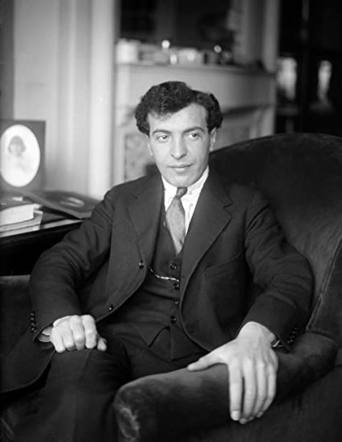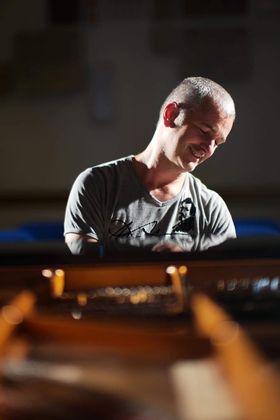Pianists From The Past continues today with this most interesting article featuring Russian/Ukrainian born British concert pianist Benno Moiseiwitsch, written by British pianist and writer Daniel Grimwood.

Why listen to pianists of the past?
In my opinion, much of the musical landscape of the present is shaped by competitions, edited recordings, possibly a separation from tradition caused by the cultural rupture of two world wars, and a certain objectivity arising from these factors. Those pianists of the period before the wars, and who we are fortunate enough to have access to recordings of, performed with a subtly different set of priorities to many performers of today. Perhaps, in our zealous pursuit of fidelity to the composers texts, we sometimes forget that the pianists of the past belonged to an unbroken tradition stretching back to Beethoven and beyond.
When Melanie suggested I write about a pianist of the past, I didn’t need to think long about which pianist to focus on. I have probably spent more hours of my life listening to recordings of Benno Moiseiwitsch than any other pianist. Whilst he is far from forgotten, he is associated so closely with the music of Rachmaninoff that it obscures the rest of his recorded legacy.
The first recording I ever listened to of Benno Moiseiwitsch was his magnificent recording of his friend, Rachmaninoff’s Moment Musicaux in E minor Op. 16 No. 4 (see link below). There was a copy of it on tape in my school’s library. Unfortunately I am too old to have had the fabulously rich access to old recordings that younger generations now enjoy on the internet, and finding his recordings wasn’t always easy. Fortunately I later learnt that I am old enough to know people who are old enough to have known him personally, and those I have spoken to remember him with great affection.
I’d like to dwell for a moment on that Rachmaninoff recording, because it tells us something of his style and musical attitude. It begins with no pedal and a fleetness of finger that wouldn’t be out of place in a Scarlatti Sonata or Bach Prelude. He plays throughout with immaculate clarity, unforced tone, neither pushing nor holding the tempo, and what comes out is a testament to the excellence of a composer who is frequently laden with a certain hysteria by many pianists.
How refreshing.
What a compliment to Rachmaninoff to say in an interpretation “I will treat your notes with the reverence usually reserved for a Bach or a Handel”. Perhaps this quality is what made Rachmaninoff hold Moiseiwitch’s performances of his works so dear.
He was born in Odessa in 1890 and eventually moved to England like his compatriot and friend Medtner (there is a delicious recording of the two of them playing Medtner’s Russian Round Dance), where he was awarded the CBE. His most famous teacher was the fabled Leschetizky with whom he studied in Vienna – the Guildhall School of Music and Drama, in London, turned him down saying they had nothing to teach him. His official debut took place in Reading, UK, followed a year later with a performance at The Bechstein (now Wigmore) Hall in London, which was tremendously successful and launched what would become a very busy career. His performances of Rachmaninoff’s Piano Concerto No. 2 Op. 18 were considered by the composer to be finer than his own. Although his performances of Rachmaninoff are what he is chiefly remembered for today, now that his full discography is easily available, there is far more for listeners to enjoy and learn from his musicianship.
Lately I’ve been fascinated by his performances of Beethoven – the 3rd and 4th Concertos, and an almost Haydnesque Waldstein Sonata Op. 53 (see link below). His are very human performances, with his trademark lightness of touch and pedal, seemingly effortless execution, wit, and intelligence, and although tempo relations within movements are fairly loose (for example, the chorale theme in the first movement of the Waldstein is very much slower than the start) his infectious, rhythmic drive bursts with vitality. He had the same teacher as Schnabel – a pianist primarily associated with the Sonatas of Beethoven – and it is a credit to Leschetizky that both pianists have such different views on how Beethoven should sound. My personal preference is for Moiseiwitsch’s more mercurial approach, and although we are very lucky to have the recordings he made of the Moonlight, Pathetique and Waldstein Sonatas, I find myself wishing he had recorded all of them, and I wonder how his deftly characterised and elegant style would sound in the late Sonatas.
Moiseiwitsch is a pianist who evades category. Wikipedia tells us “Benno Moiseiwitsch CBE was a Russian/Ukranian born British pianist” He lived through revolution, war, and redrawn national bounderies. Artistically he was an inheritor of an old European pianistic tradition stretching back more than a century, yet displayed a startlingly modern and unsentimental approach (full of sentiment, yet with no trace of sentimentality, as my old teacher Peter Feuchtwanger put it). He is chiefly remembered for the grandeur of his aristocratic renditions of the most tremendous Romantic concertos, and his recording of Tchaikovsky’s Piano Concerto No. 1 in B flat minor Op. 23 (first link below) remains one of the finest ever recorded, yet he seems completely at home in the most intimate classical repertoire. Given a choice between dazzle or charm, he usually leans on the side of charm, and to me, simply, he is the most charming, original, and thought-provoking pianist I have ever listened to.

(Photo credit: Jörg Ehmer)
Publications
Melanie Spanswick has written and published a wide range of courses, anthologies, examination syllabuses, and text books, including Play it again: PIANO (published by Schott Music). This best-selling graded, progressive piano course contains a large selection of repertoire featuring a huge array of styles and genres, with copious practice tips and suggestions for every piece.
For more information, please visit the publications page, here.